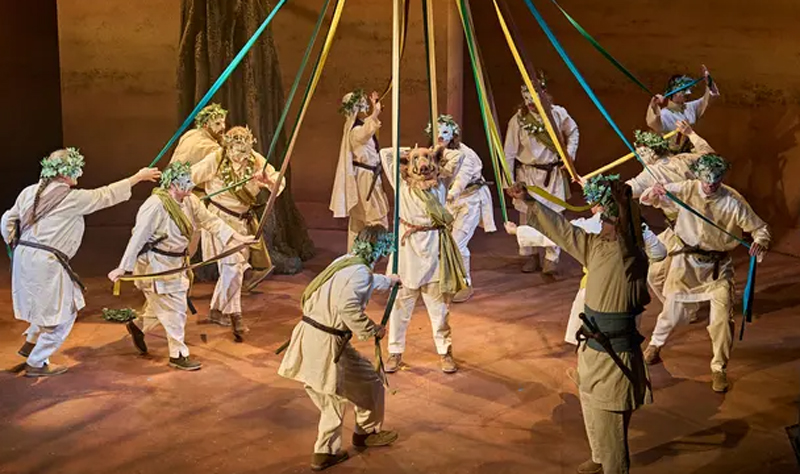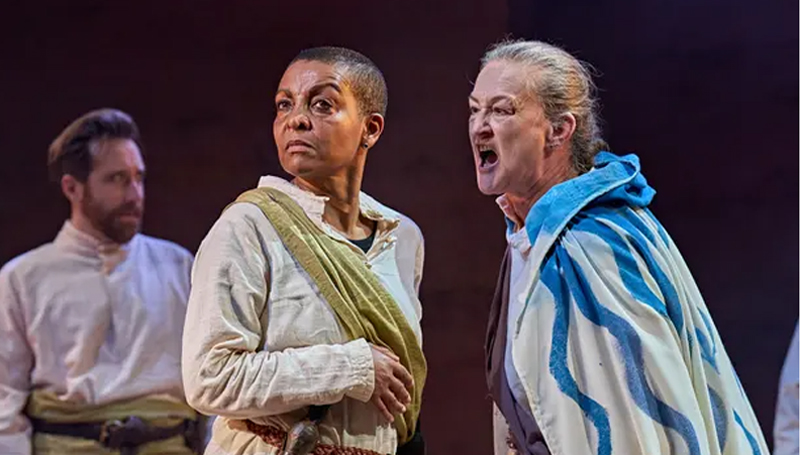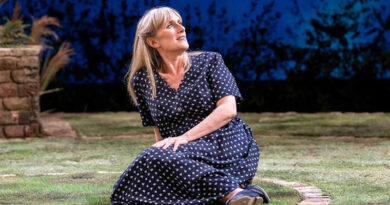“Richard III” at Rose Theatre, Kingston
Jeremy Malies in Kingston, London
2 May 2023
This is a concept production based on a pretext that soon runs out of momentum. Adjoa Andoh directs herself as Richard. Her portrayal of the character in no way suggests being differently abled and the presentation is androgynous with no gender-swapping. Richard is shown to be treated as psychologically abnormal by society as a whole (“pathologized” is the word used in programme notes) on account of being Black.

The ensemble.
Photo credit: Manuel Harlan.
I did not even understand Andoh’s intentions until I read her introductory programme essay. She describes a childhood in the Cotswolds during which she felt a kinship with Richard on account of being judged only by physical appearance. With most people’s initial attitude when entering the theatre these days being ethnicity blindness unless prompted otherwise, I felt slow-witted but not devastated at failing to understand the direction that Andoh had taken on what I maintain is minimal evidence.
The Wars of the Roses are depicted here as a conflict between a family in the west of England and one in Wales, with many scenes taking place on what I took to be the Devon or Somerset coast. The fact that both factions are suddenly transported to Leicestershire’s Bosworth Field (resolutely in the very centre of England when I last looked) is not regarded as an obstacle.
But there are many positives. Andoh refuses to anchor the piece in a cultural frame and the incidental references are more or less timeless including Morris dancing and a maypole. The actors wear the simplest of tunics in white or red with sashes in other colours to hint at their rank and background. There is a striking scene at the beginning in which Andoh has a boar’s mask placed on her while she stands under the maypole. The other characters dance around her and ensnare her with the ribbons. This may be symbolic of the obstacles that Richard will have to overcome to attain power, and the image stays with me as several characters (notably Hastings) refer to Richard as a rampaging omnivorous boar careering around the country.
Andoh is successful in portraying Richard’s ironic detachment, and the surprising amounts of solid comic material in the play come across well as Richard feigns piety while interacting with archbishops and a bishop in front of the public.

Adjoa Andoh as Richard.
Photo credit: Shonay Shote.
Another robust scene (often my criterion for judging a version of this play) is the great dream narration by Clarence (Oliver Ryan) in which the actor gives the whole theatre a claustrophobic atmosphere through our collective fear of drowning. I felt keenly the wasteful death of a charismatic statesmanlike royal who has at least analysed the previous violence closely and is obviously a fine orator who might have united the warring factions. Just as proceedings have become one-paced, the dream sends us spinning to the bottom of the sea. The versatile Ryan reappears later to do impressive work as Lord Mayor of London and Duke of Norfolk with an illusion of spontaneity.
The verse-speaking (nearly all the cast members use West Country or Welsh accents) is universally first-rate under voice coach Jeannette Nelson and dialect coach Shereen Ibrahim. It comes as no surprise that Shakespeare’s metre proves sufficiently elastic to accommodate Bristol ‘l’s and rhotic ‘r’s. This even extends to chanting (the cast finish “Now is the winter …” for Andoh) and a ballad with Phoebe Shepherd as Lady Anne breaking into folk song. (The score is by Yeofi Andoh.)
Equally satisfying is the minimalist but evocative set design by Amelia Jane Hankin. Three moss-encrusted trees predominate and they look in no way healthy, this being an overarching reference to the observation by Buckingham (Joseph Kloska): “The noble isle doth want her proper limbs.” The body politic is the forest politic here. More trees are hinted at in a backcloth with broad-leaved woodland. A forest is created by Chris Davey’s lighting design which constantly evokes dawn and dusk with mackerel hues.
There are few props, no formulaic trumpet flourishes by heralds, and the general intention is to keep everything slick. Several mentions of Julius Caesar (Andoh excelled as Portia in production of the play at Stratford set in a modern African state) hint that we could be in ancient Rome or Greece. Elsewhere, Andoh’s direction injects a vaguely pagan atmosphere.
However you are interpreting the piece, nothing will stick out as anachronistic. It’s a cohesive form and this is one of the many merits. Classical overtones are reinforced by the assassinations taking place not quite offstage but with the actors appearing as oversize silhouettes behind the backcloth, the shadows again conjured up by Davey’s wonderful lighting. The ghoulish element in me always looks forward to Clarence’s drowning in a butt of wine and I reflect that there could be worse ways to go. Here we see little, but Benjamin Grant’s sound design includes some imaginative gurgling.
Andoh’s finest moment (though Shakespeare is doing the heavy lifting) is the dream at Bosworth Field in which all the murder victims appear dressed in suits of taffeta strands which suggest the constricting maypole that Richard has never quite escaped. Here, Andoh conveys acute self-hatred at making bad decisions.
I don’t believe Andoh is in anyway technically lacking. This is a performer who has been an RSC stalwart. She also conceived and co-directed a production of Richard II at Shakespeare’s Globe in which she played the mesmerizing and sexually ambiguous title character. Andoh has of course also appeared on screens across the world in the Netflix hit Bridgerton.
I simply don’t think Richard III is ripe for being seen through a lens of post-colonialism and racial prejudice. The source material is surely about despotism, a sociopath whose evil nature means he is hardly constrained by that term, as well as the perennial theme of regime change. There simply isn’t the textual, cultural, or historical evidence to even begin the process of showing Richard being ostracized by race. I would question the rigour with which this project was assessed in the early stages. I took it as polemic and believe it smacks of bravura.
.
~









